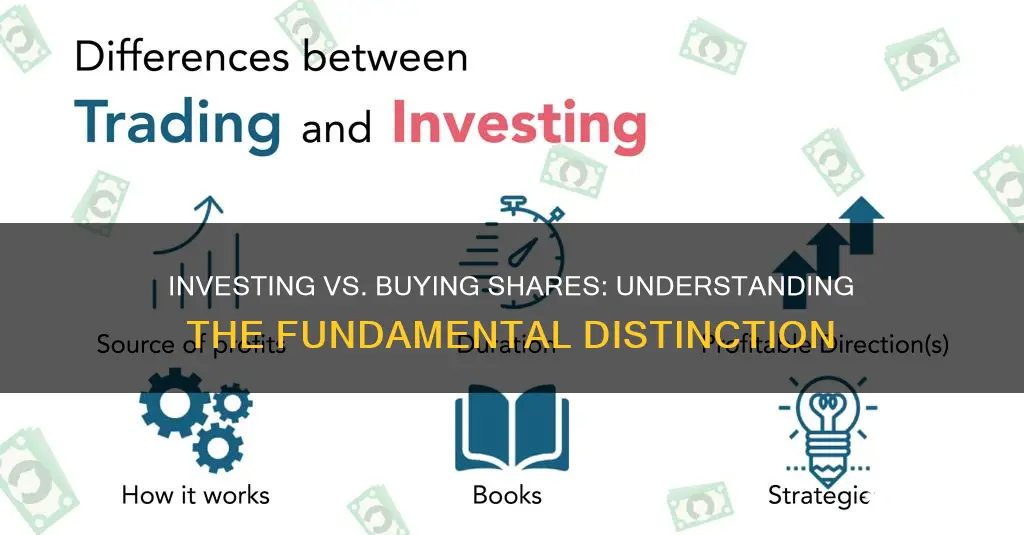
Investing and buying shares are two different methods of growing wealth in the financial markets. Investing is the broader concept, encompassing a range of assets and strategies for long-term growth and income. It involves allocating money or resources to various assets or ventures, including stocks, bonds, real estate, and mutual funds, with the expectation of generating returns or income over time. On the other hand, buying shares is a specific action within investing, where individuals or entities purchase ownership stakes in a publicly traded company, becoming shareholders. This provides them with certain rights, such as potential dividends and voting rights, proportional to the number of shares owned. While both strategies carry risks and require careful consideration, investing takes a more comprehensive and long-term approach, while buying shares can be done for shorter periods, focusing on the performance of a specific company.
What You'll Learn
- Investing is a broader approach, buying shares is a specific action within it
- Buying shares gives ownership rights, investing may or may not
- Investing is long-term, buying shares can be short-term
- Buying shares is a simple activity, investing requires thorough research
- Investing is more diverse, buying shares is focused on individual companies

Investing is a broader approach, buying shares is a specific action within it
Investing and buying shares are distinct financial strategies, with investing being the broader approach and buying shares a specific action within it.
Investing: The Broader Approach
Investing is a long-term strategy, focusing on a diverse range of assets to build wealth over time. It involves committing money or resources to various ventures, including stocks, bonds, mutual funds, real estate, and more, with the expectation of generating returns. This can be done through active investing, where investors monitor the market regularly and adjust their portfolio accordingly, or passive investing, where investors follow a buy-and-hold strategy without closely monitoring the market.
Buying Shares: A Specific Action
Buying shares is an action within the broader investing strategy. It involves purchasing ownership stakes in a publicly traded company, becoming a shareholder. Shares are individual units of ownership, also known as stocks or equity. When an individual buys shares, they are investing in a specific company, with the potential for capital gains and dividends.
While both strategies carry risks and require careful consideration, they differ in scope and timeframe. Investing encompasses a wide range of asset classes and strategies, while buying shares focuses on a specific company's performance and is not limited to a particular timeframe.
The Wall Street Code: Unlocking the Secret to Investing Success
You may want to see also

Buying shares gives ownership rights, investing may or may not
Buying shares and investing are two different methods of growing wealth in the financial markets. While buying shares is a specific form of investment, investing is a broader approach that encompasses various assets and strategies.
Buying Shares Gives Ownership Rights
When an individual buys shares, they acquire a portion of a company's equity, becoming a part-owner of the business. The number of shares owned determines the extent of ownership, with each share representing the smallest denomination of a company's stock. Shareholders are entitled to certain rights, such as voting privileges and potential dividends. These rights may vary depending on the class of shares held.
Investing May or May Not Entail Ownership Rights
Investing, on the other hand, involves allocating money or resources to various assets or ventures with the expectation of generating returns or income. While some investments, like buying shares, entail direct ownership rights, others may not provide the same level of ownership. For example, investing in bonds represents a loan to a government or corporation, while investing in mutual funds involves pooling funds with other investors.
Key Differences
The main difference between buying shares and investing lies in their scope and focus. Buying shares is a specific action focused on acquiring ownership in a particular company, while investing takes a broader approach by diversifying across different asset classes and strategies. Investing typically involves a long-term perspective, whereas buying shares can be either short-term or long-term, depending on the investor's goals.
Invest in Cars: Buyer's Guide
You may want to see also

Investing is long-term, buying shares can be short-term
Investing and buying shares are two different methods of growing wealth in the financial markets. While investing is a long-term strategy, buying shares can be short-term.
Investing is Long-Term
Investing involves a comprehensive approach, focusing on long-term growth and income. It encompasses a diverse range of assets, such as stocks, bonds, real estate, mutual funds, and more. The goal is to gradually build wealth over an extended period, typically years or decades. This is achieved by buying and holding a portfolio of these assets. Investments are often held through market fluctuations, with the expectation that prices will eventually rebound and losses will be recovered.
Buying Shares Can Be Short-Term
On the other hand, buying shares is a specific action within investing. It involves acquiring ownership in a particular company by purchasing its stock. This can be done through brokerage accounts, where investors can place market orders to buy shares at the current market price or use limit orders to set a specific price. Buying shares can be either short-term or long-term, depending on the investor's goals. It may range from day trading to holding shares for an extended duration. Traders who buy and sell shares for short-term profit focus on technical factors and aim to capitalise on price fluctuations.
Key Differences
The main difference between investing and buying shares lies in their timeframe and scope. Investing takes a broader approach, considering a portfolio of various assets to achieve long-term financial goals. In contrast, buying shares focuses on ownership in individual companies, with returns tied directly to their performance. The risk associated with buying shares is typically higher as it is concentrated in a specific company's stock.
Fisher Investments Pay Periods: Unveiling the Mystery
You may want to see also

Buying shares is a simple activity, investing requires thorough research
Buying shares and investing are two different methods of growing wealth in the financial markets. While they share this common goal, they differ in terms of timeframe, level of activity, and the degree of research involved.
Buying shares is a specific action within investing and can be a simple activity. It involves purchasing ownership stakes in a publicly traded company, giving the shareholder voting rights and potential dividends. Shareholders can buy shares through a brokerage account, either at the current market price or a specified price. This process typically requires less extensive research, as it focuses on monitoring the trend and looking out for a stable company's share price. Shareholders might aim to keep their shares for a relatively shorter period, capitalising on short-term trading strategies or holding them for an extended duration.
On the other hand, investing involves a broader approach, encompassing various assets and strategies for long-term growth and income. It requires thorough research and analysis of market trends, company financials, and economic indicators to make informed decisions. Investors often take a long-term perspective, aiming for capital appreciation and income generation over an extended period. They tend to diversify their portfolios by spreading investments across different asset classes to manage risk. This comprehensive approach considers a portfolio of assets to achieve overall financial goals.
While buying shares is a specific form of investment, investing is a more complex and dynamic process that requires careful consideration of financial goals and market conditions. It involves committing money or resources to a diverse range of assets, including stocks, bonds, mutual funds, real estate, and more, with the expectation of generating returns over time.
Smart Strategies for Investing a Million-Dollar Retirement Nest Egg
You may want to see also

Investing is more diverse, buying shares is focused on individual companies
Investing and buying shares are distinct financial strategies, and a key difference lies in their scope and focus. While investing adopts a broader approach, buying shares narrows in on individual companies.
Investing encompasses a diverse range of assets and strategies, aiming for long-term growth and income. It involves allocating money or resources to various assets, such as stocks, bonds, real estate, mutual funds, or cryptocurrencies, with the expectation of generating returns. This diversification across different asset classes helps manage risk and enhance portfolio stability.
On the other hand, buying shares is a more focused strategy. It is a specific action within investing, where individuals or entities purchase ownership stakes in a publicly traded company. When buying shares, investors acquire a portion of a company's equity, granting them ownership rights, potential dividends, and voting privileges. This approach concentrates on the performance of a specific company, which may expose the investor to higher risks and rewards.
The diverse nature of investing allows for a comprehensive approach to achieving financial goals. It enables individuals to spread their investments across different sectors and industries, reducing the impact of any single company's performance. In contrast, buying shares provides a more direct way to own a piece of a particular company, offering the potential for higher returns but also carrying the risk of greater losses.
Both investing and buying shares have their advantages and considerations. Investing offers a broader set of options and can be tailored to an individual's financial goals and risk tolerance. It may involve long-term investment strategies, value investing, or diversified portfolio management. On the other hand, buying shares provides a more targeted approach, allowing investors to focus on specific companies they believe in and potentially benefit from their growth.
Unveiling the Mystery: Calculating the Time for Your Investment to Double
You may want to see also
Frequently asked questions
Investing is a broader strategy that involves allocating money or resources to various assets with the expectation of generating returns or income over the long term. Buying shares is a specific form of investment where individuals purchase ownership stakes in a publicly traded company, becoming shareholders.
Investing typically takes a long-term approach, with investors holding assets for years or decades. Buying shares can be either short-term or long-term, depending on the investor's goals, ranging from day trading to holding shares for an extended duration.
Both investing and buying shares carry risks and potential rewards. Investing generally involves lower risk and lower returns in the short run but can deliver higher returns over time through compounding interests and dividends. Buying shares can be riskier as it often involves holding assets for a shorter time frame, and the returns are directly tied to the performance of the specific company.
The primary goal of investing is to grow wealth over the long term by diversifying across different asset classes to manage risk. Buying shares focuses on acquiring ownership in individual companies, with returns tied to their performance, potentially offering capital gains and dividends.
When investing, individuals consider broader factors such as market trends, economic indicators, and asset class dynamics. When buying shares, the focus is on analyzing the financial health of a specific company, industry trends, and market conditions influencing that particular company.







